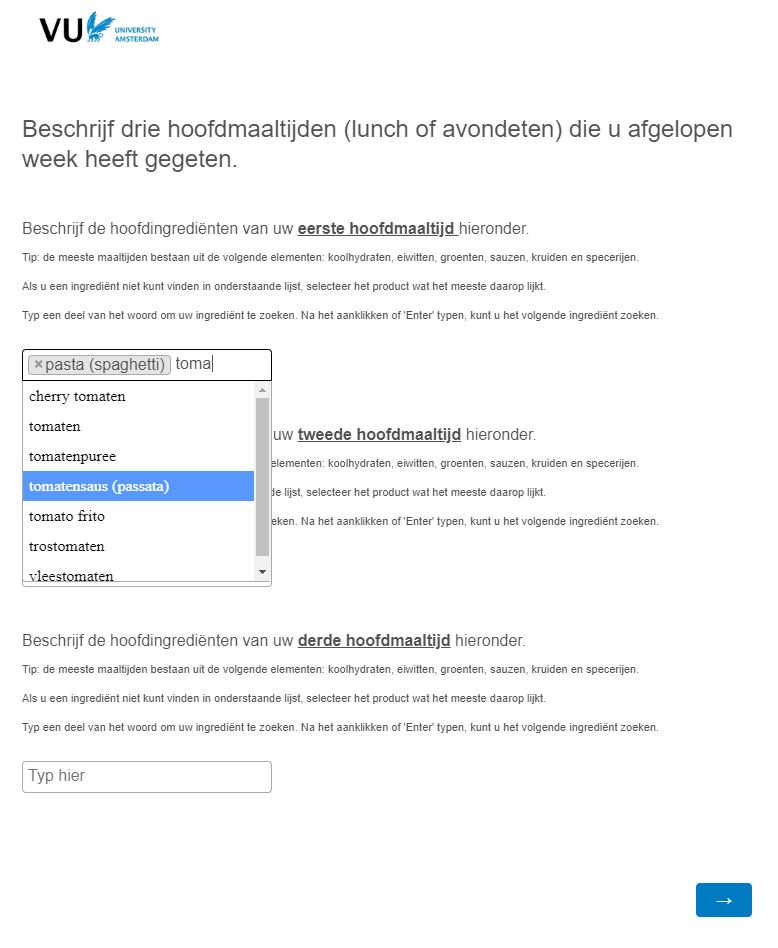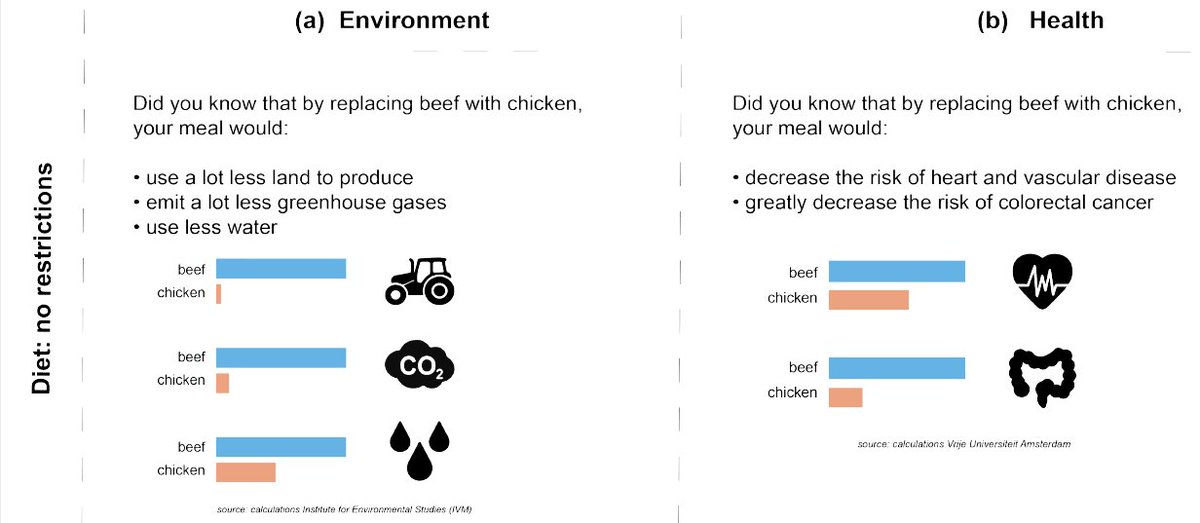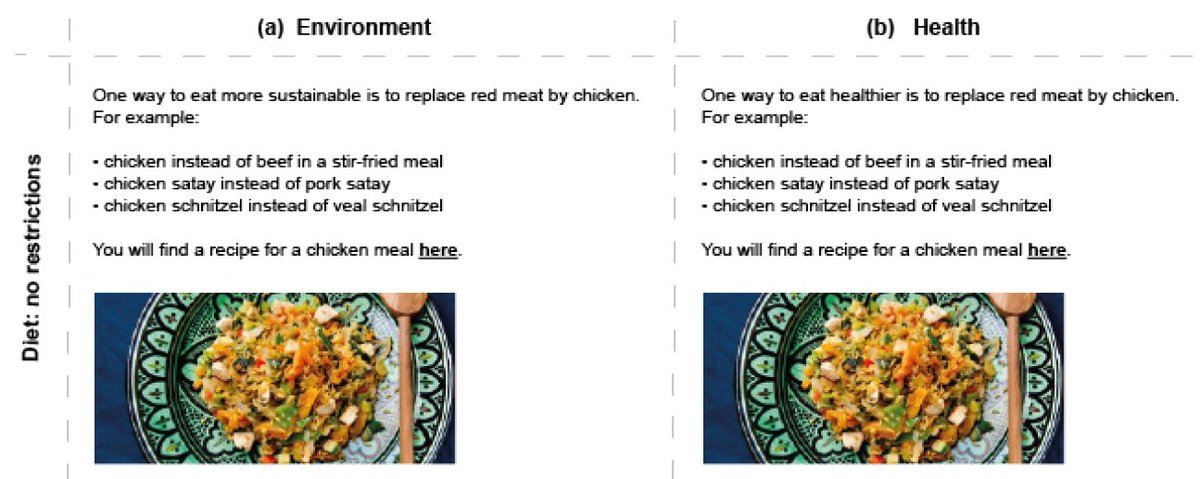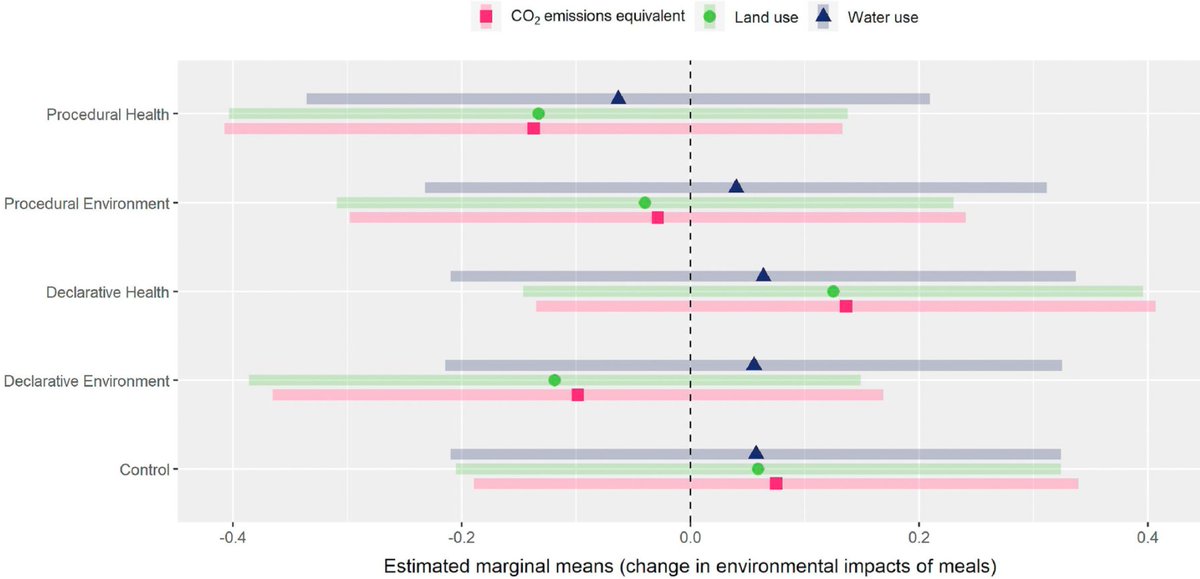Paper: https://doi.org/10.1016/j.jenvp.2021.101610
Thread">https://doi.org/10.1016/j... on results and the process
Our first question: what do people think is sustainable food? So we started with two surveys and qualitative interviews. Many people struggled with different aspects of sustainability (production process, transportation, packaging) 2/n
We wanted data about behavior, so we asked subjects to upload receipts of their shopping. Student assistants were asked to code the data. Hard work, still messy data. 3/n
We learned a lot from these & #39;scoping studies& #39;, including that data input should be easier. So in the next phase we asked subjects to enter the ingredients of their meals. 4/n
Now we could calculate environmental impacts much better, combining the ingredients with results from life cycle assessments (LCA) thanks to @ZigaMalek (check out the appendix for this data!) 5/n
Next step: an intervention! Inspired by the scoping studies we focus on health vs. environmental motivations. Here is the descriptive treatment (different ones for vegetarians, flexitarians, vegans etc) 6/n
And the procedural intervention, which linked to a recipe on the website of @voedingscentrum and a list of ingredients to replace 7/n
RESULTS: we find that the procedural health treatment has the most potential: one week later the environmental impacts of the reported meals were significantly lower. 8/n
For more results, read the paper  https://abs.twimg.com/emoji/v2/... draggable="false" alt="😀" title="Grinsendes Gesicht" aria-label="Emoji: Grinsendes Gesicht">there is also info about how far off people& #39;s perceptions are. Thanks to my co-authors and all the amazing students that helped along the way! 9/9 - end
https://abs.twimg.com/emoji/v2/... draggable="false" alt="😀" title="Grinsendes Gesicht" aria-label="Emoji: Grinsendes Gesicht">there is also info about how far off people& #39;s perceptions are. Thanks to my co-authors and all the amazing students that helped along the way! 9/9 - end

 Read on Twitter
Read on Twitter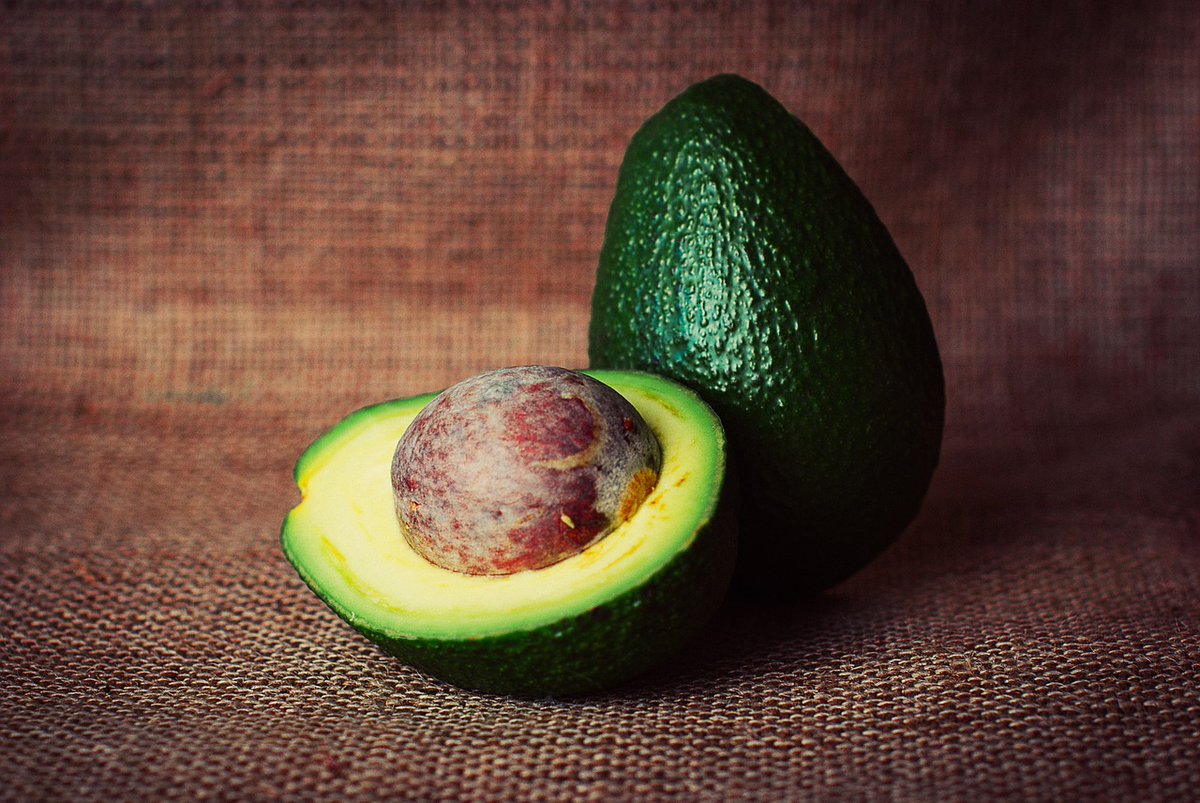 Paper alert!https://abs.twimg.com/emoji/v2/... draggable="false" alt="🚨" title="Polizeiautos mit drehendem Licht" aria-label="Emoji: Polizeiautos mit drehendem Licht">In 2018 I got in touch with Meike Morren, @JuliaBlasch @ZigaMalek about motivating people to eat more sustainably. Now in @JEnvPsych #openaccess with lots of figures and cool appendices. Paper: https://doi.org/10.1016/j... on results and the processhttps://abs.twimg.com/emoji/v2/... draggable="false" alt="👇" title="Rückhand Zeigefinger nach unten" aria-label="Emoji: Rückhand Zeigefinger nach unten">" title="https://abs.twimg.com/emoji/v2/... draggable="false" alt="🚨" title="Polizeiautos mit drehendem Licht" aria-label="Emoji: Polizeiautos mit drehendem Licht">Paper alert!https://abs.twimg.com/emoji/v2/... draggable="false" alt="🚨" title="Polizeiautos mit drehendem Licht" aria-label="Emoji: Polizeiautos mit drehendem Licht">In 2018 I got in touch with Meike Morren, @JuliaBlasch @ZigaMalek about motivating people to eat more sustainably. Now in @JEnvPsych #openaccess with lots of figures and cool appendices. Paper: https://doi.org/10.1016/j... on results and the processhttps://abs.twimg.com/emoji/v2/... draggable="false" alt="👇" title="Rückhand Zeigefinger nach unten" aria-label="Emoji: Rückhand Zeigefinger nach unten">">
Paper alert!https://abs.twimg.com/emoji/v2/... draggable="false" alt="🚨" title="Polizeiautos mit drehendem Licht" aria-label="Emoji: Polizeiautos mit drehendem Licht">In 2018 I got in touch with Meike Morren, @JuliaBlasch @ZigaMalek about motivating people to eat more sustainably. Now in @JEnvPsych #openaccess with lots of figures and cool appendices. Paper: https://doi.org/10.1016/j... on results and the processhttps://abs.twimg.com/emoji/v2/... draggable="false" alt="👇" title="Rückhand Zeigefinger nach unten" aria-label="Emoji: Rückhand Zeigefinger nach unten">" title="https://abs.twimg.com/emoji/v2/... draggable="false" alt="🚨" title="Polizeiautos mit drehendem Licht" aria-label="Emoji: Polizeiautos mit drehendem Licht">Paper alert!https://abs.twimg.com/emoji/v2/... draggable="false" alt="🚨" title="Polizeiautos mit drehendem Licht" aria-label="Emoji: Polizeiautos mit drehendem Licht">In 2018 I got in touch with Meike Morren, @JuliaBlasch @ZigaMalek about motivating people to eat more sustainably. Now in @JEnvPsych #openaccess with lots of figures and cool appendices. Paper: https://doi.org/10.1016/j... on results and the processhttps://abs.twimg.com/emoji/v2/... draggable="false" alt="👇" title="Rückhand Zeigefinger nach unten" aria-label="Emoji: Rückhand Zeigefinger nach unten">">
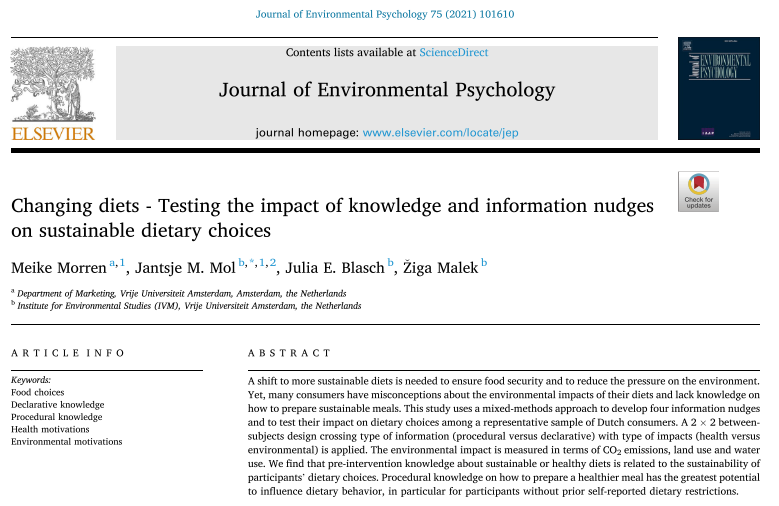 Paper alert!https://abs.twimg.com/emoji/v2/... draggable="false" alt="🚨" title="Polizeiautos mit drehendem Licht" aria-label="Emoji: Polizeiautos mit drehendem Licht">In 2018 I got in touch with Meike Morren, @JuliaBlasch @ZigaMalek about motivating people to eat more sustainably. Now in @JEnvPsych #openaccess with lots of figures and cool appendices. Paper: https://doi.org/10.1016/j... on results and the processhttps://abs.twimg.com/emoji/v2/... draggable="false" alt="👇" title="Rückhand Zeigefinger nach unten" aria-label="Emoji: Rückhand Zeigefinger nach unten">" title="https://abs.twimg.com/emoji/v2/... draggable="false" alt="🚨" title="Polizeiautos mit drehendem Licht" aria-label="Emoji: Polizeiautos mit drehendem Licht">Paper alert!https://abs.twimg.com/emoji/v2/... draggable="false" alt="🚨" title="Polizeiautos mit drehendem Licht" aria-label="Emoji: Polizeiautos mit drehendem Licht">In 2018 I got in touch with Meike Morren, @JuliaBlasch @ZigaMalek about motivating people to eat more sustainably. Now in @JEnvPsych #openaccess with lots of figures and cool appendices. Paper: https://doi.org/10.1016/j... on results and the processhttps://abs.twimg.com/emoji/v2/... draggable="false" alt="👇" title="Rückhand Zeigefinger nach unten" aria-label="Emoji: Rückhand Zeigefinger nach unten">">
Paper alert!https://abs.twimg.com/emoji/v2/... draggable="false" alt="🚨" title="Polizeiautos mit drehendem Licht" aria-label="Emoji: Polizeiautos mit drehendem Licht">In 2018 I got in touch with Meike Morren, @JuliaBlasch @ZigaMalek about motivating people to eat more sustainably. Now in @JEnvPsych #openaccess with lots of figures and cool appendices. Paper: https://doi.org/10.1016/j... on results and the processhttps://abs.twimg.com/emoji/v2/... draggable="false" alt="👇" title="Rückhand Zeigefinger nach unten" aria-label="Emoji: Rückhand Zeigefinger nach unten">" title="https://abs.twimg.com/emoji/v2/... draggable="false" alt="🚨" title="Polizeiautos mit drehendem Licht" aria-label="Emoji: Polizeiautos mit drehendem Licht">Paper alert!https://abs.twimg.com/emoji/v2/... draggable="false" alt="🚨" title="Polizeiautos mit drehendem Licht" aria-label="Emoji: Polizeiautos mit drehendem Licht">In 2018 I got in touch with Meike Morren, @JuliaBlasch @ZigaMalek about motivating people to eat more sustainably. Now in @JEnvPsych #openaccess with lots of figures and cool appendices. Paper: https://doi.org/10.1016/j... on results and the processhttps://abs.twimg.com/emoji/v2/... draggable="false" alt="👇" title="Rückhand Zeigefinger nach unten" aria-label="Emoji: Rückhand Zeigefinger nach unten">">

